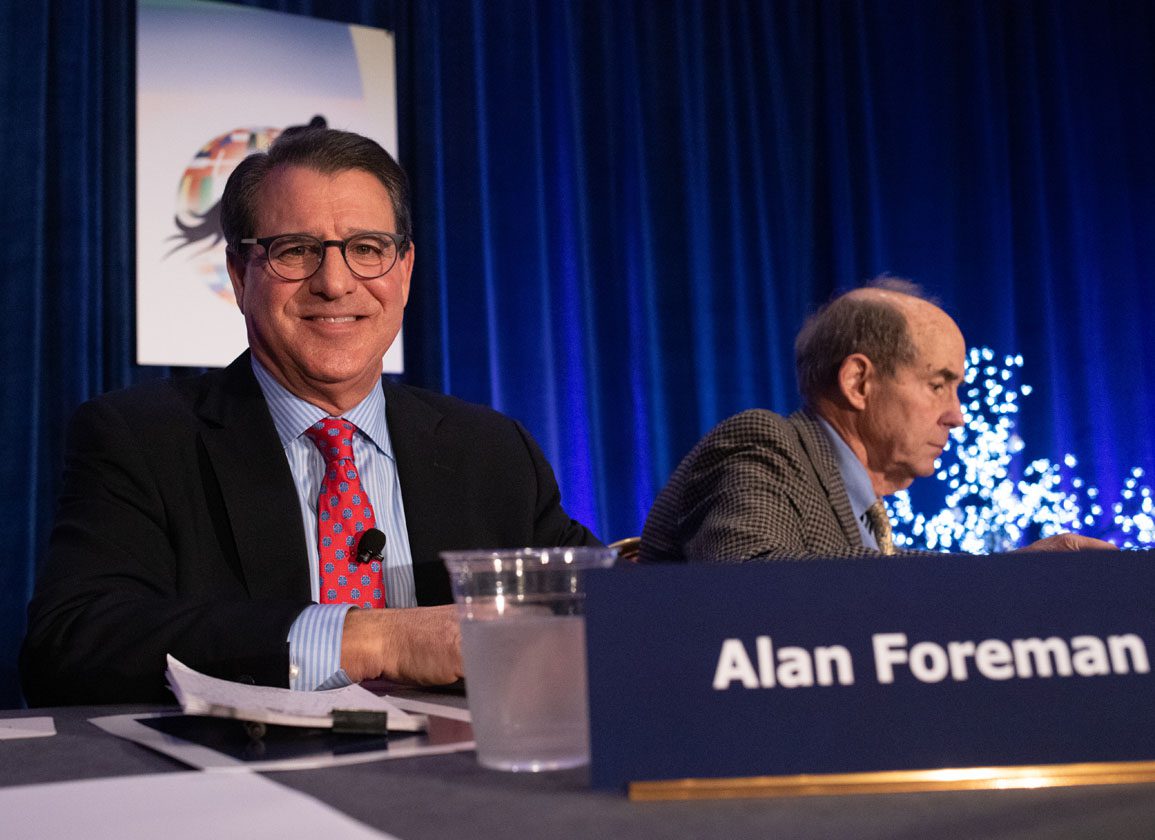By T. D. Thornton
A panel discussion titled “From Data to Dollars: Understanding Horse Racing's Economic Impact As Racing's Future is Questioned” during Wednesday's Global Symposium on Racing hosted by the University of Arizona Race Track Industry Program (RTIP) led off with moderator Alan Foreman confronting “the elephant in the room that we dodge.”
Foreman, the chairman and chief executive officer of the Thoroughbred Horsemen's Association, said racing is facing an “existential moment” at a time when industry stakeholders increasingly must make the case for the sport's so-called social license to exist in the face of intense pressure from anti-racing activists and a younger generation of Americans who hold the belief that animal-based entertainment is more cruel than cool.
“It's not about foal crop. It's not about field size. It's not about whether we have a core product,” Foreman said, ticking down the list of the common concerns that industry insiders often debate.
“The single biggest issue right now [is] should the federal government, and should our state legislatures, continue to support our business?” Foreman said.
Foreman then rephrased his rhetorical question more bluntly so there would be no misunderstanding: “Is it time to end horse racing in this country?”
Foreman certainly doesn't think so, and neither did the panelists who joined him at the podium.
But the group did try to offer pearls of wisdom as to how industry stakeholders might fight back when confronted with that question.
Their answers largely centered on the sharing of strategies for getting across the industry's far-reaching scale and the potential ramifications of ceasing racing, and several speakers even articulated how some entities in the sport have effectively lobbied their respective states to secure financial incentives, bolster racing programs, and modernize facilities, like the currently underway rebuild of Belmont Park and the planned re-imagining of Pimlico Race Course.
Foreman pointed out that even though there is now federal oversight in the form of the Horseracing and Safety Act (HISA) Authority, racing in the United States remains primarily a state-sanctioned business, and how much of the industry operates under laws that were enacted for vastly different economic reasons decades ago than what we face now.
Every year at about this time when applying for next season's racing dates, Foreman said, track operators increasingly have to defend why their states should support our sport's way of doing business.
“The point is, what the state giveth, the state can taketh,” Foreman summed up.
And demonstrating that we are upholding that “social license” must take the form of deeds and not just words, Foreman said. He and the other panelists also concurred that the sport's narrative also must be backed up by accurate economic data, which helps to drive home points to legislators and regulators.
What we need to successfully convey, Foreman said, is “if you talk about the economics of this business; the value of horse racing to the economies, of our local communities, of our states, of our country…I think that we can overcome this very challenging environment that we are in.”
Julie Broadway is the president of the American Horse Council (AHC), a national organization whose work and data helps not only racing stakeholders, but everything equine-centric in the country, under a scope that ranges from broad national issues to smaller initiatives at the local government level.
“You cannot sit still and sit back and wait for people in [government] to figure out what goes on in our industry and what it's all about,” was Broadway's assessment of how to approach dealing with politicians who can help usher through changes via legislation.
Regardless of the level of government, Broadway said the approach is largely the same. Getting your message across means 1) educating decision-makers; 2) setting context and dispelling misinformation and inaccuracies about your position; 3) stating the positive and pointing out unintended and/or negative consequences, and 4) making the overall narrative relatable and personal.
Those points are all underpinned by being armed with the proper data, Broadway said.
Najja Thompson, the executive director of the New York Thoroughbred Breeders, said that a lot of times when racing people go in to make their cases to legislators, they have to be aware that they'll be dealing with a lower-level staffer at first. “And they're not listening to me unless I have the data to implore them to get their representative to speak to me directly on why racing is important in New York,” he said.
But, Broadway added, racing industry stakeholders can't benefit from that data if they don't join in to help compile it.
Broadway gave the example of a recently undertaken AHC economic impact study that sought to include feedback from the racing industry. The data will eventually be used to underscore the importance of horse racing within America's larger equine population, and it will be available for anyone who wants to cite it in making their case for support from legislators.
Yet only four Thoroughbred tracks responded.
“This survey was out for more than six months,” Broadway explained. “I'm sad to say that the Thoroughbred racing industry had a really low response rate. I mean, we really had to beg for data.”
Broadway contrasted that with participation from the harness racing industry, “because they really stepped up. They are getting their own breakout report just on Standardbred racing [that will] cut across all states where Standardbred racing occurs.”
Lonny Powell, the chief executive officer of the Florida Thoroughbred Breeders' & Owners' Association, said he was stunned to hear that support from Thoroughbred tracks was so low.
“That's amazing. That's tough. How are we going to tell our story if nobody's even trying?” Powell said.
“I'm always a track guy,” Powell continued, alluding to his years in track management prior to a career turn toward executive jobs with industry entities. “And I just don't get it. I don't get why you wouldn't want to tell the story.”
Tom Rooney, the president and chief executive officer of the National Thoroughbred Racing Association, pointed out that being a reliable broker of data is important, but that you need to also skillfully be able to tell the story of those numbers in a narrative form to get your point across to non-racing listeners.
“Clearly, the data is about jobs. It's about farms. It's about these things that we're used to going away, and maybe having to change the way that we work,” Rooney said. “If you work in the horse racing industry, you're kind of the subculture of skills that's probably applicable [in] very few other places. So we live in our own world, and we wouldn't be here if we didn't think that world was a good and beautiful endeavor to belong to.”
Added Powell: “You've got to be able to tell somebody what the consequences are if your industry goes away.”
Powell also pointed out that reams of data are great, but that time in front of legislators is limited, so racing stakeholders need to distill it into manageable, relatable chunks.
“You've got to know it. You've got to believe it. You've got to have confidence in it. And you really have to care about the industry you're talking about. Otherwise, it's just a study,” Powell said. “Make your story relatable to those that aren't in our industry.”
Several panel participants underscored that people in racing have to take the time to forge personal bonds with legislators so the sport's stakeholders can be viewed as trusted sources.
In other words, don't go seeking help from politicians for the first time only when “your back's against the wall,” Powell cautioned.
“Are you kidding me? You've got to develop relationships. That takes years,” Powell said.
Foreman stressed that the racing industry needs to hone (and often repeat) the message that the sport is an economic engine, and that the money it generates often gets reinvested back into the community in ways that aren't apparent to legislators.
“Here's something that very rarely gets talked about, but legislators love to hear this,” Foreman said. “Racing is a community. We take care of our people,” he continued, giving examples of how in his home state of Maryland, the horsemen's health system provides full health care for the people who work in racing.
“That is something that doesn't fall back on the local economy, that doesn't fall back on social services. It doesn't fall back on the state,” Foreman said. “It's the racing industry that supports that. We take care of the people who work with us, [and] that resonates with legislators. And that's why they're willing to support the industry, because they understand the local impact that it has.”
To get that story across to political decision-makers, Foreman said, “we combined the economic impact with the social license aspects of it, and that's the takeaway.”
Powell, however, had a different message to impart, speaking directly to RTIP students. He prefaced his comments by letting the RTIP majors know that he is a graduate of that program who was attending his 41st edition of the annual symposium, and that he understood how some of the presentations over the past two days that focused primarily on industry problems might be giving students second thoughts about pursuing a career in the sport.
“Don't change your major,” Powell implored them, his voice at times cracking with emotion. “That's exactly why you're needed in leadership. That's exactly why you're needed in this business. Because we need people that believe you can make progress versus 'ride it all out.'”
“It's difficult. It's changing,” Powell said of horse racing. “But you can't give up.”
Not a subscriber? Click here to sign up for the daily PDF or alerts.









